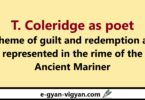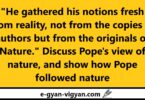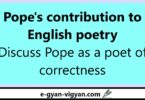
Wordsworth as a poet | Different stages of Wordsworth’s love for nature | Chief features of Word worth’s poetry
Wordsworth as a poet
Introduction-
Independence and equality were the key- notes of the society of England during of boyhood of Wordsworth. The French Revolution (1789) stirred the consciousness of entire Europe, and awakened the conscience of the people that was smarting under the bloated ego and arrogance of the aristocracy. Repugnance prevailed against the life of profligacy and flippancy. The slogans of the Revolution, “liberty, Equality and Fraternity” were in the air scattering all around the scintillating sparks of inspiration. In the realm of literature reaction had already set in against the artificiality in tone, and the “gaudiness and inane phraseology” of neo-classical poetry, which was mostly town poetry and was aristocratic in temperament. Rousseau’s call for “Return of Nature” inspired of youth. Wordsworth wrote:
“Bliss was it in that down to be alive
But to be young was very heaven.”
Further,
“France standing on the top of golden hours,
And human nature seeming born again,”
Wordsworth’s holiday journey to France and Switzerland in 1790 provided the material for “Descriptive Sketches’. He paid a second visit to France in 1792. This was the most formative period of his life. Wordsworth’s friendship with Coleridge which began about 1796 did much to stimulate his genius. In collaboration with Coleridge, words worth published the epoch-making book, the ‘Lyrical Ballads’ in 1798. In it Romanticism was represented by Coleridge. Naturalism by Wordsworth. This was the beginning of the Romantic Movement. The ‘Lyrical Ballads’ contained 23 poems (19 by Wordsworth, 4 by Coleridge). It was published again in 1800 with a preface which was further expanded in its 1802 edition. The preface is a momentous document in the history of English criticism. It is called the manifest two of the Romantic Movement, Wordsworth’s most celebrated poem. Tin tern abbey’ and Coleridge’s The Ancient Mariner’ Appeared in the first edition of the ‘Lyrical Ballads’ in 1798. ‘The Prelude’ was begun in 1799 and was complete in the first version by 1805. In 1807 Wordsworth published ‘Poems in Two Volumes’ The Ode On the Intimations of Immortality and ‘Memorials of a Tour in Scotland’ and many of his best sonnets appeared in this famous work. All his best work was done in the decade from 1797-1807.
As a Poet of Nature-As a Nature Mystic-
Wordsworth is chiefly down as a poet of nature. He was also a great poct of man. As a poet of nature, he inspired the poets of the coming generations.
Wordsworth is universally recognized as the “high priest of nature”. He himself proclaimed that he was A Worshipper of Nature.” Love of nature was in his bold. His greatest contribution to Nature-Poetry is that he gave a soul of Nature. It was his firm belief that Nature has a soul just as man has a soul. And the soul of nature is all-pervasive. He further believed that a communion between the soul of man and the soul of nature could be established through concentrated perception of the beauties of nature. Beyond that, much more could be achieved. Words worth believed that through contemplation and meditation perfect spiritual communion could be established between the soul of man, soul of nature and the divine soul, i.e. the Supreme spirit, God, the Immanent will. Coming to such a state of being, as Wordsworth said, “We are laid asleep in body, and become a living soul.” Wordsworth was fortunate enough to have this sort of Mystic Experience’. Thus, in Wordsworth, love of nature and mysticism are fused together. His treatment of nature in Poetry is the musical expression of his mysticism in his poetry. This developed gradually buy steadily.
Nature-Childhood-Mysticism-
Some critics say that there is a clash between art and moral purpose in Wordsworth’s poetry. Actually. Wordsworth’s love of nature. Cult of childhood and mysticism are fused together. His treatment of nature in Poetry is the musical expression of his mysticism in his poetry. Out of this comes out his Moral teaching. This is a natural and steady development of his art. In his treatment of nature this is expressed in four stages.
Stage in the Growth of his Love of Nature-
This mystic experience, this spiritual conception of nature did not come to the poet at once. Wordsworth tells in the ‘Prelude’ and in the “Tintern Abbey’ that there were four stages in the development of his love of nature.
(1) First stage- In the first stages love of nature was simply a healthy boy’s delight in freedom and the open air. It was pure and simple physical pleasure. In that stage when he came among those hills he “like a roe bounded over the mountains” and derived physical pleasure from nature. He did not try to find out anything in nature. At that time nature to him was “all in all”. He was concerned with the outer aspect of nature. His own delight was foremost. Nature was “But secondary to my own pursuits.”
(2) The second stage-Then followed a period of sensuous love of nature. Like Keats, Bosworth loved the sensuous beauties of nature. Keats said, “O, for a life of sensations rather than of thought” Wordsworth said:
“The sounding cataract
Haunted me like a passion
X X X
That had no need of a remoter charm.
By thought supplied.”
He was then concerned with the sensuous pleasure only. He had no interest “unborrowed from the eye” That is to say; he did not have any interest beyond sensuous pleasure.
The third stages- Words worth writes in “Tintern Abbey, “That time is past”. Now Wordsworth enters the third stage of his love of nature. His love of nature is humanized. Now Wordsworth has learned-
“To look on nature, not as in the hour of thoughtless youth, but hearing often tics, the still, sad music of humanity.”
Wordsworth’s perception of nature is growing deeper and deeper, from the physical to the sensuous. From the sensuous to the intellectual. And now from the intellectual to the spiritual. This is the natural development of his love of nature. Hence onward love of nature and mysticism are fused together.
The fourth Stage- The sprite’s stage: His pantheism-The first three stages were transitory. The spiritual stage was lasting. Like a mystic Words worth went deeper and deeper into this stage. He now felt in nature a “Presence-a sense sublime-whose dwelling is the light of setting suns, and the round ocean and the living air.” Wordsworth now finds in nature a spirit that impels:
“All thinking things, all objects of all thought,
And rolls through all things”
Wordsworth feels that the Divine soul pervades the entire universe. It is present in every object of nature. This is his Pantheism. This is the philosophy of the ‘Bhagwad Gita.’ it is elaborately explained in the Seventh and the tenth chapters of the ‘Gita’
Nature as a teacher-
The mystic experience became deeper and deeper. The intensity of this experience led him to the stage of ‘Samadhi’- the deeper contemplation and meditation. Wordsworth felt in this stage-
“And even the motion of our human blood/Almost suspended, we are laid asleep, in body, and become a living soul.”
In such a stage of deep meditation, Wordsworth had a vision. He got some message from nature. It was from the Divine soul whose presence he found in nature. It was moral. Thus, nature became a teacher. Wordsworth sang in another poem-
“One impulse from a vernal wood,
May teach you more of man
Of moral evil and of good.
Than all the sages can.”
Nature now became to him both “law and impulse”
As a Poet of Man-
Wordsworth was not only a poet of nature but also a poet of man, of human nature. He be lived that human nature is the mirror which in its purest form can reflect the great blessings of nature, namely, fortitude, spiritual dignity, resolution, independence, goodness, sympathy, kindness and such virtues. He also believed that in its purest form human nature can be found in the poor and the rustics who live in the countryside in the lap of nature. Wordsworth’s definition of poetry and his theory of poetic diction are closely allied with his attitude towards nature and his concept of human nature. This finds full expression of his poems of Man.
In ‘Resolution and Independence’ or “The Leech-Gatherer”, he writes:
“My whole life I have lived in pleasant thought”
This infect is the pure and serene picture of the simple life of the countryside. Life of the rustics, of the poor people, life free from worries and anxieties free from high ambitions. Wordsowrth further explains his concept of human nature in his ‘Ode to Duty, His writes-
“Serene will be our days and bright,
And happy will our nature be,
When love is an unerring light
And joy its own delight.”
Poetic imagery-Wordsworth’s poetry like that of other Romantic poets abounds in beautiful poetic imagery. His one single poem, “Tin tern abbey’s is a glowing example of words worth’s excellence in the use of poetic imagery. Tin tern Abbey’ sounds in poetic imagery. We have beautiful sensuous imagery in the poem. Words worth’s auditory images are highly remarkable. The critics have observed that Wordsworth was the poem of the ear; Shelley was the poet of the Eye. Some illustrations of his poetic imagery are given below-
(1) “I hear these waters, rolling from their mountain-spring”
(2) “The sounding cataract haunted me like a passion”
(3) “Whose dwelling is the light of the setting sun and the Round Ocean and living air?”
Conclusion-
Wordsworth was a “high priest of Nature”, a “worshipper of Nature”, a “harbinger of the Romantic Movement”. He was a great lover of Nature. He was a mystic. He as pantheist. He considered himself a teacher, a moral preacher. He loved calm and quiet aspects of Nature. He believed that a communion could be established between the soul of man, soul of Nature and the divine soul. Wordsworth was a great poet of man also. He rightly deserved to be the leader of the Romantic Movements; he was the literary Patriarch of the Romantic Age. By all standards words worth was a very great poet.
English – Important links
- Hero of ‘Paradise Lost’ | Hero of Milton’s ‘Paradise Lost’ | Who is the hero of ‘Paradise Lost’
- A note on Milton’s Grand style
- Paradise Lost as a classical Epic | How does Milton employ classical epic convention in his Invocation in paradise last Book.
- “The heights were within Pope’s reach, and he reached them.” Justify and criticise
- If Pope be not a poet, where is poetry to be found?” Comment on this judgment of Johnson on Pope
- Pope’s contribution to English poetry | Discuss Pope as a poet of correctness
- “He gathered his notions fresh from reality, not from the copies of authors but from the originals of Nature.” Discuss Pope’s view of nature, and show how Pope followed nature
- Supernatural machinery of ‘The Rape of the Lock’
Disclaimer: e-gyan-vigyan.com is created only for education purpose and education sector. We only provide links and materials already available on the Internet. If in any way it violates the law or there is any problem then please mail us- vigyanegyan@gmail.com







